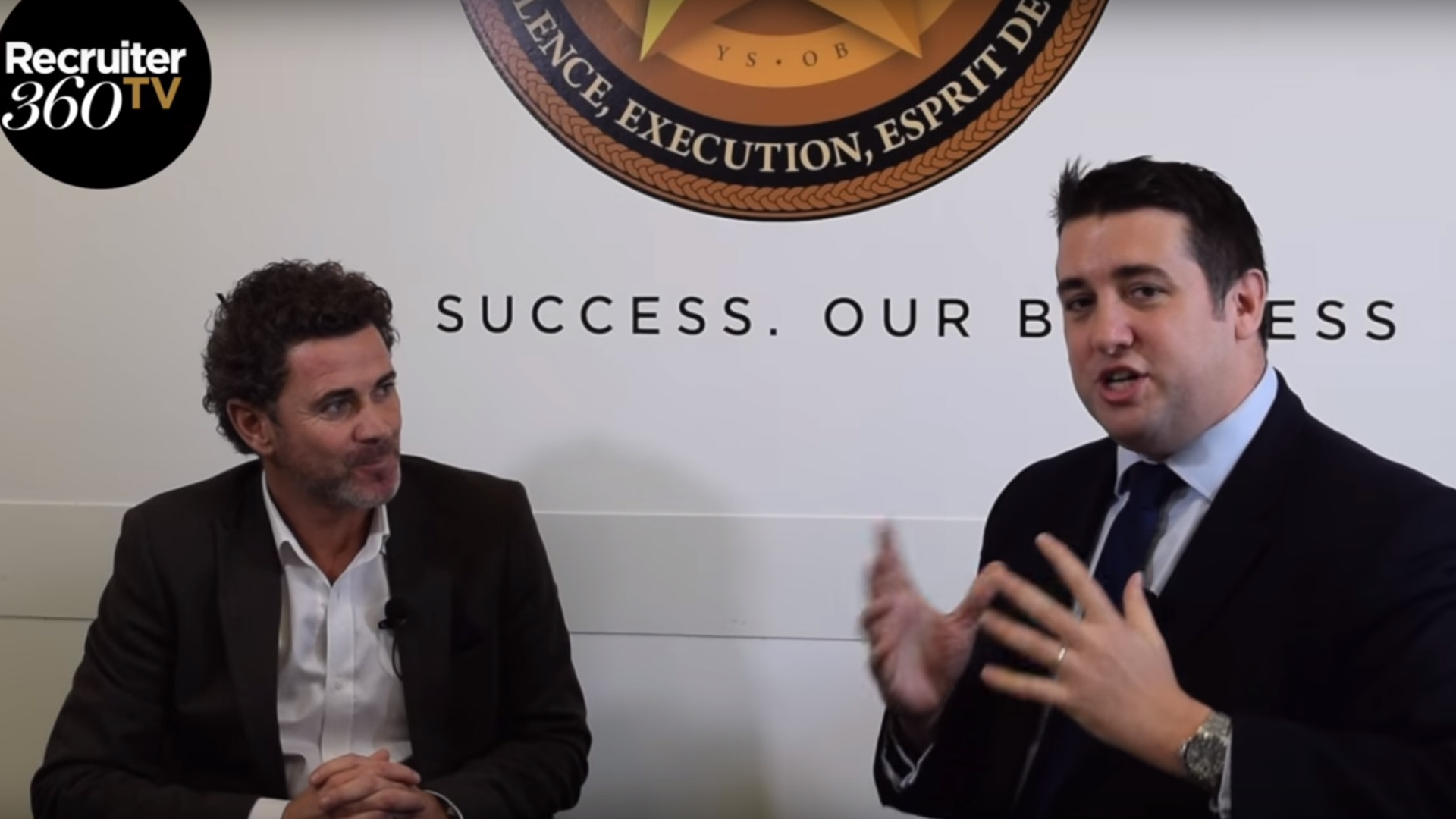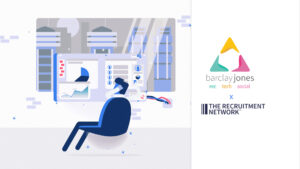Recently TRN Chairman, James Osborne, was interviewed by Toby Babb, on Harrington Starr’s Recruiter 360 TV, for a 3-part series of videos. Here we have an overview of the interview in part one, all about raising the bar.Recently TRN Chairman, James Osborne, was interviewed by Toby Babb, on Harrington Starr’s Recruiter 360 TV, for a 3-part series of videos. In the first part Toby and James talk about how we can raise the bar in the recruitment industry and what we, as recruiters, can do to really add value to our customers and candidates.
Here we have an overview of the interview in part one, all about raising the bar, or you can watch the video of part one below.
Toby: Tell us some more on how you think the recruitment industry can evolve and how we can raise the bar?
James: Let’s go back a stage and start with the industry itself, it’s brilliant. If you look at the Global economy and the UK economy in particular, the recruitment industry really is the forerun and the driver of the economy.
We bring talent into the market place and support our customers to grow. It’s a wonderful industry that often gets a bad reputation, from time to time, but there are lots of agencies that are not doing as much as they could do to really capitalise on their position in the market place.
When you look at the industry as a whole and look at the recruitment agencies that are in the industry, there is a real need to raise the bar and change how we are perceived, especially with a potential recession on the horizon.
Toby: Interesting that you mentioned recession and the threats that come with that. We started our business in 2010, but I’ve always seen it as a great opportunity. The stronger get stronger and it’s a great leveller isn’t it?
James: Yes, it does whittle out some of the poor practice in the industry when the going gets tougher. If you look at the companies that have really prospered during the recession they have had to a lot of naval gazing, looking within their own business. They’ve had to ask themselves ‘what are we really doing’ and ‘what is the impact that we are really making on the market and on our clients and candidates’.
This has really forced them to up their game and raise the bar themselves. The recession doesn’t mean the markets are bad, it just means that they are different and changing. Those organisations that are planning for this and are ready to adapt are in the best place, they are the ones that will do well.
Toby: What are the important things to do to position yourself and your company if the markets do turn difficult?
James: The number one thing to do is to consolidate. The relationships that we have with our clients and customers can often be very loose or light. Now is the time to really get close to your customers and consolidate what you’ve got.
A lot of recruitment organisations have a certain amount of market share with their clients, which they think is a lot, but it probably isn’t, from a base on what customers spend on recruitment. Now is the time to look into what your customers are doing and spending and making sure that you are increasing the amount of coverage you have within those customers.
Now is the time to get your claws into your customers, in a positive way, so that when the going gets tough and they look at reducing the number of agencies they are using, you are at the forefront of their mind, at the top of the food chain. That’s why the consolidation piece is so important now.
Toby: Maybe you’re doing 2 or 3 placements with your customers but there are 20, 30 or 40 placements to be made in that same company. How can you go from making 2 or 3 to making 20 or 30 placements? What are the tricks to doing that?
James: The number one thing is to deliver a phenomenal service. If you deliver a service that is above and beyond your customers and candidates expectations, they will naturally want to stay with you, they will want to hang out with you and give you more business. Making sure that we’re educating the customers and that they’re getting return on their investment.
Secondly, get in front of customers and ask them the question. We spend a lot of time hiding behind screens or the phone, which is typical of a lot of industries, but we need to get out and go to see your customers, speak to them. We need to properly understand their pains, what they’re going through, where they’re trying to get to next year and then we need to be there to help them try to solve these issues.
We are deemed as consultants, it’s the brand or job title that is most used in the recruitment industry, but we don’t do enough consultancy with our clients. The relationship is a bit too transactional and we end up becoming subservient with them. We position ourselves as a supplier, but we are not, we are part of a partnership and it sounds fluffy but it’s true. The more we try and position that with our customers and our customers realise that, the closer we will grow to our customers and the more they want to stay with us.
Toby: From being in the industry for over 18 years and one of my frustrations is how people perceive themselves as a recruiter. There is a pride associated with professions such as lawyers and accountants, but when you look at the recruitment industry there isn’t that same pride.
The recruitment industry places one of the most important commodities in any businesses that they wouldn’t be able to grow without, which is people. The reputation has got to catch up hasn’t it? People have got to recognise the importance of their job and the importance of them as a professional service, right?
James: Definitely yes, I think there are lots of companies in the recruitment industry who do have this pride in what they do, I think Harrington Starr is a good example of that.
Where it goes wrong in recruitment is that we are a fairly KPI driven industry, so there’s a huge focus on ‘how many of these have you done’, ‘how many of those have you done’. What we lose sight of is the very measurable, tangible impact that we are making on our customers and on the market. When you start talking to your customers about the quality of the candidates, the retention of the candidates that we’re placing and impact that those candidates are having even 18 months down the line.
When you start measuring that from a monetary point of view, two things happen. The first is that customers really start to engage with you, so the conversations you have about margins become irrelevant because they are focusing on the bigger picture. Secondly, the pride and passion that we have as recruiters significantly goes up, because we realise that we’re not just trying to hit a KPI. We actually realise that we’re having a transformational impact on their business and we’ve charged ‘x’ and they get a return on investment of ‘y’, which is significantly tenfold more. That’s when you can look in the mirror and think ‘I’ve actually done something really quite powerful today’.
Toby: One of the proudest things in my career was a business I worked with that was when they were 20 strong, and we saw that business develop. We put 150 people into that business over a relatively short period and they sold the business for £75-80 million. We knew that business inside and out and knowing that we really important in growing that business from 20 business to a £75 million exit.
James: That’s it and that company couldn’t have done that without you, without the people you provided and the impact you’ve had is significant.
I think that is such an important thing, which is why I’m such a fan of bringing in the customers you’ve worked with and introducing them to your consultants and say, ‘we’ve worked with this guy for 18 months, this is the difference we’ve made to his business and ask him what would you not have been able to do if we had not provided you with those people?’ and that’s huge, then that pride and passion really comes into it and we can talk to the market to say that ‘you need us’.
Toby: You mention that consulting angle and it’s something that we talk a lot about in our company, about how we are managing expectations, but more importantly giving them something of value. Talking to them about people who they can’t necessarily get and how they have to position themselves as brands and the brand personas and propositions. It’s absolutely what you have to do as a recruitment company to advise on how they interview, how they deliver and how they attract the best possible people, right?
James: Completely and that’s just part of it. The old days of traditional recruitment, which is just find me a body, that’s sort of fizzled out a lot now. Now it’s a complete 360 talent picture and I think the recruitment industry is sitting right in the middle of that. So, advising organisations, in partnership, how can we help you have a better brand and to be the brand of choice in your market place, because it’s competitive, talent shortage and everything else.
‘How can we help you, when you find people, to attract them and engage them properly?’
‘What are the key motivators and drivers of the people and personas in your market?’
‘How you can retain those people?’
‘When they’ve been with you for 6 months, what happens next?’
‘How can we even help you with that?’
I think that the impact that the recruitment industry or recruitment consultant can have on, not just finding a person, but on everything else around that talent piece is significant and the recruitment companies that we are seeing growing exponentially are the ones really playing that game.
Toby: It’s a labour of love and it takes time and effort and it isn’t necessarily an immediate return, but if people are genuinely investing in this, the returns are inevitable, aren’t they?
James: Absolutely and I think it’s the same with any business, you’ve got invest in your customer base. You’ve got to think about whether you are really solving your customers’ pain points and if you want to build, as a recruiter, a sustainable desk, where you’re not having peaks and troughs and you’re seeing continuous growth and lots of good referrals, you have to do something which is for the long game. The short wins will come eventually, but you want to build something that has sustainability, for sure.
So, that’s the end of part one, but you can watch part 2 and part 3 with Toby Babb and James on our Recruitment Expertise Dashboard.
Share :



